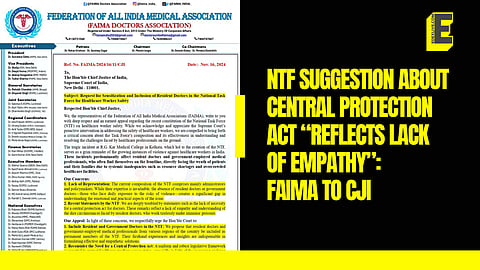

The Federation of Resident Doctors’ Associations (FAIMA) wrote to the Chief Justice of India (CJI), putting forth some issues they have with the National Task Force (NTF) constituted by the Supreme Court of India to issue recommendations to improve the safety of healthcare workers following the RG Kar Medical College rape-and-murder incident in Kolkata.
In their letter, issued today, November 16, FAIMA points out two concerns, namely the lack of representation of resident doctors in the NTF, and the recent suggestion the NTF made to the Central Government.
Regarding the first concern, FAIMA says that the NTF is only comprised of policymakers and administrators. The federation says that the absence of resident doctors or government doctors, who “face daily exposure to the risk of violence,” creates a lacuna in understanding the “emotional and practical aspects” of the issue.
FAIMA also took objection to the NTF’s recent suggestion that there was no need for a central protection act for healthcare workers. “These remarks reflect a lack of empathy and understanding of the dire circumstances faced by resident doctors, who work tirelessly under immense pressure,” FAIMA wrote.
Therefore the federation appeals to the following:
Inclusion of resident and government doctors and medical professionals from across the country
Reconsideration of the need for a uniform and robust legislative framework, that is, the Central Protection Act, in light of increasing violence against doctors
“We firmly believe that the inclusion of those directly affected by these challenges will bring a unique and necessary perspective to the Task Force's deliberations. Their involvement will not only ensure that the policies and protocols designed are pragmatic but also instil a sense of confidence among the medical fraternity,” FAIMA says.
